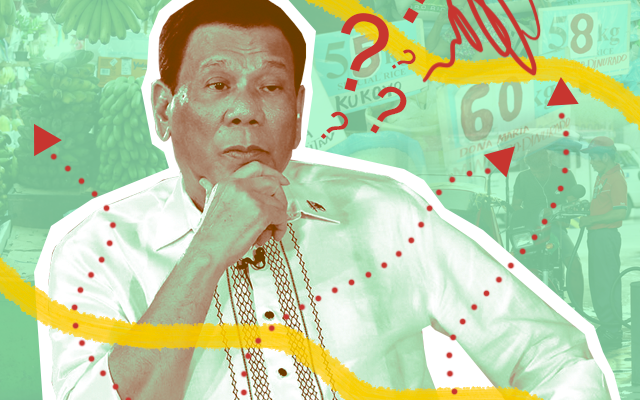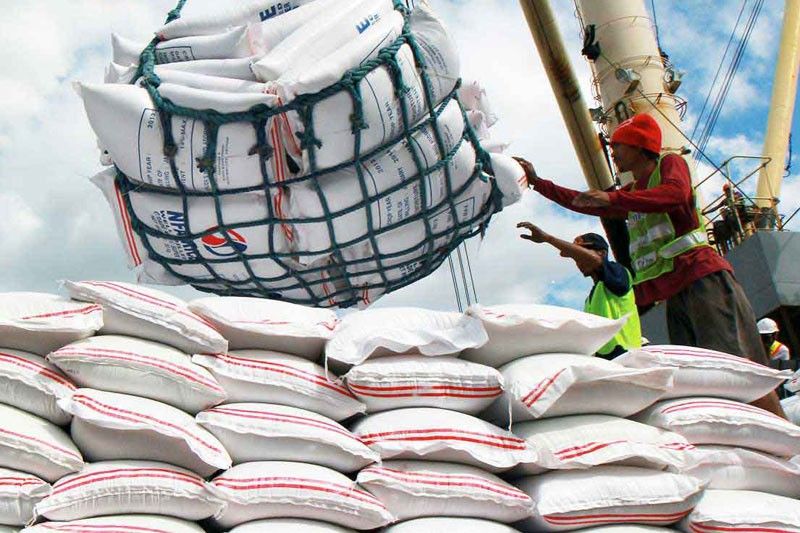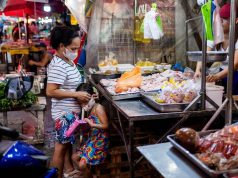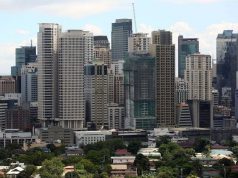
President Rodrigo Duterte’s ‘national address’ that was done through a têtê-a-têtê has left some people dissatisfied since he failed to share concrete solutions for the country’s problems such as the high inflation rate which is affecting the prices of basic commodities.
While he talked about various topics with Chief Presidential Legal Counsel Salvador Panelo, Duterte repeatedly mentioned Senator Antonio Trillanes, his most vocal critic.
Some of the other topics he mentioned were the supposed ouster plots against him, martial law in Mindanao, the Boracay re-opening, the entrance of a third telecommunications company, inflation and rice supply crisis.
Meanwhile, Filipinos expressed their dissatisfaction over the lack of concrete solutions he had failed to discuss on the last two topics.
The tête-à-tête talkshow of Mr. Duterte and Salvador Panelo does not necessarily talk about combating inflation and poverty.Rather it talks more about Trillanes, his amnesty, et al.
Ginoong Pangulo, ang kalaban mo ay inflation at kahirapan — hindi ang Oposisyon. #OneOpposition
— Rayyan Jabril || جِبْرِيل ريَّان (@luceat_lux88) September 12, 2018
More and more people now realize that Duterte is not interested in making our lives better.
He doesn’t care about inflation and its ill effects on the citizens’ capacity to buy basic necessities.
He only wants revenge on people who oppose and expose him.
— K (@Legally_K) September 11, 2018
Duterte and Panelo wasted my time watching their nonesense circus. I am very DISAPPOINTED akala ko kc may GOOD NEWS like bababa na ang price ng bigas at matitigil na ang mahabang pila sa pagbili ng NFA rice at may solution cla sa rising inflation.Pero WALA. Im a DDS @Abi_Valte
— Che (@che_mendioro) September 11, 2018
Highly anticipated
The Palace announced that Duterte would make a nationwide address to Filipinos on Tuesday, September 11, which was highly-anticipated by citizens.
Presidential spokesperson Harry Roque said that it was supposed to be a press conference to be held at 3 in the afternoon. “He announced in Davao that he wants to speak to the nation,” he said.
Some schools prepared for the scheduled event and held a live stream for their students.
Now happening: Students of Ateneo de Manila University livestreaming in MVP re: Duterte's Declaration / Press Conference in PTV.
Ateneo is with the rest of the Philippines in the fight for democracy. pic.twitter.com/EmXg8gOClK
— Hyacenth Bendaña ? (@hyabendana) September 11, 2018
At around 2:20 p.m., Roque said that instead of a national address, it was going to be a têtê-a-têtê with Panelo. Only People’s Television Network, some close-in writers and the Palace were admitted to cover.
Why people were disappointed
Political analyst Dindo Manhit believes that the têtê-a-têtê was an opportunity for Duterte to open up about his administration’s challenges.
“The President wanted to talk about it, not addressing the opposition, not addressing people who were critical of him, but I think the general public,” he said in an interview.
“What I see here from a political point of view is that the President wanted to talk to the people — his constituency —through broad media reach and explain his stand on issues confronting his government,” Manhit continued.
He theorized that Duterte might have resorted to a têtê-a-têtê instead since there is a lesser chance for the media to “control the message… control the narrative if it were the independent press corps.”

However, the têtê-a-têtê failed to specifically address the high inflation rate that has largely affected Filipinos.
A previous report showed that Filipinos are very much concerned about the issue, particularly the rising prices of basic commodities. They have shared pictures of food, vegetables and snacks with higher prices than usual all over social media.
Electricity rates have also increased last August after a hike in generation charge. According to Manila Electric Co., overall rates have gone up by P0.0265 per kilowatt-hour.
Prices of rice have also increased for the past eight months, as stated by the Philippine Statistics Authority. The price of a well-milled rice has risen by 10 percent at the start of August compared to a year ago.
There is also the case of rice shortage where National Food Authority announced that their stock of cheap rice has heavily deteriorated.
Furthermore, there is the issue of imported rice being infested with weevil that has prompted Tindig Pilipinas to challenge Agriculture Secretary Manny Piñol to consume them.
When Duterte addressed the issue of inflation in his têtê-a-têtê, he said, “The economic managers are working on it. We are having a Cabinet meeting right after this and I’ll also have the chance to ask some questions.”
“The economic life of the country cannot be a bed of roses,” he added.
Duterte stated that the rice crisis was “artificial” and caused by “man-made manipulation.” The only way to solve the problem was to import more rice, he noted.
He also mentioned that he would think about abolishing the National Food Authority Council as he believes it has no purpose. It is the Philippines’ policy-making body that focuses on rice and food security. — Artwork by Uela Altar-Badayos









